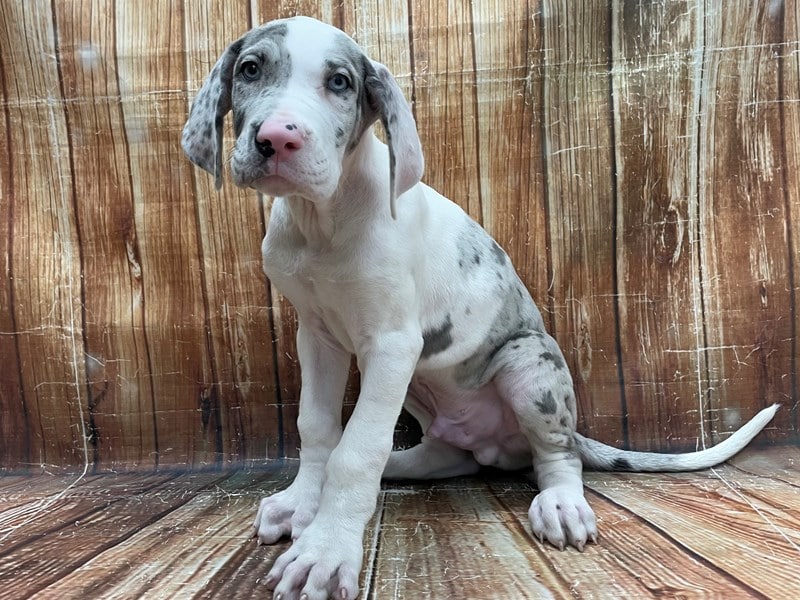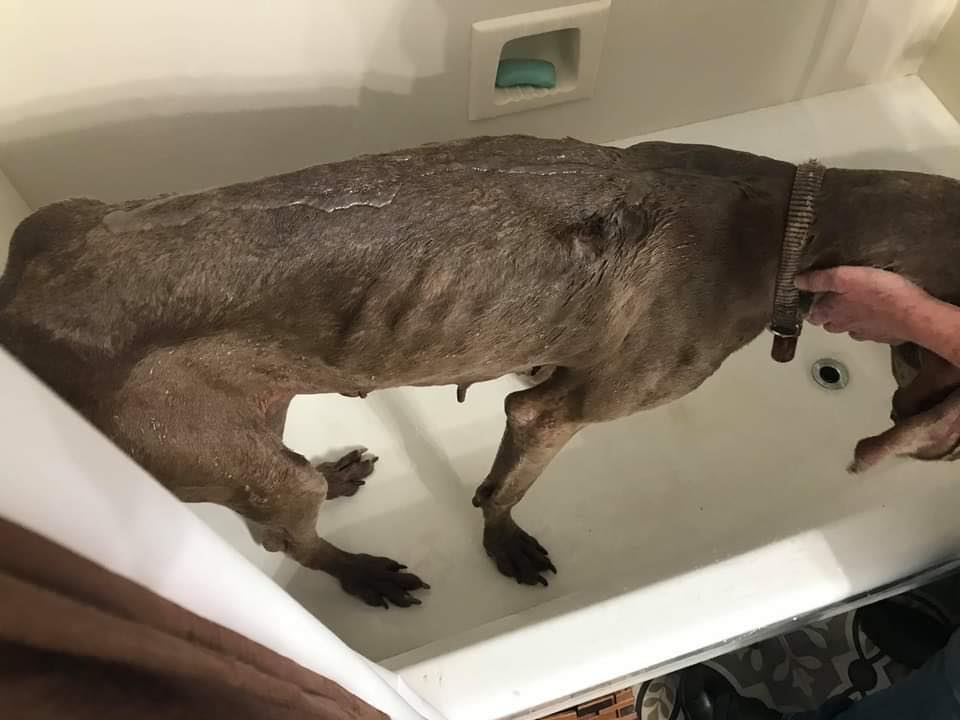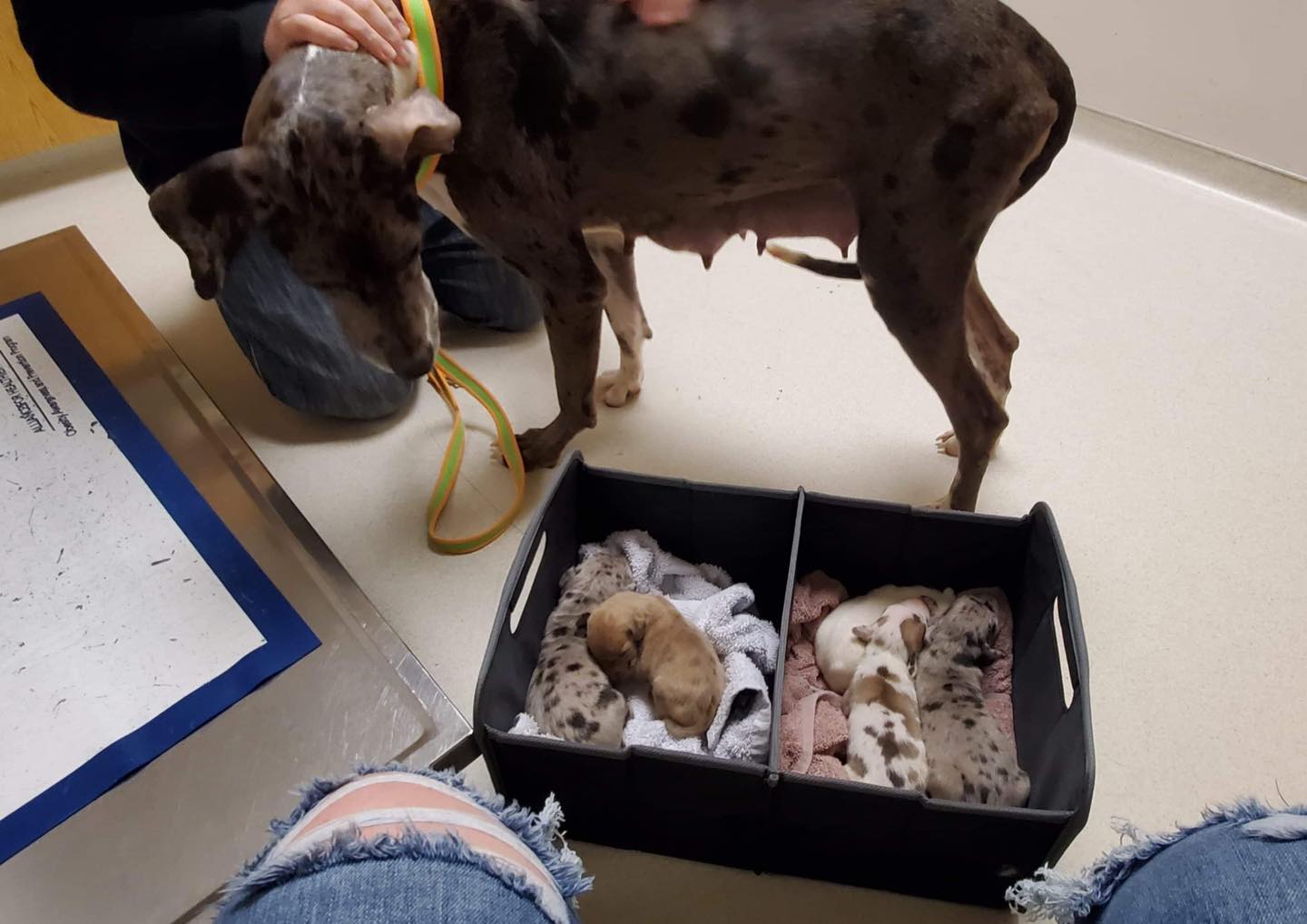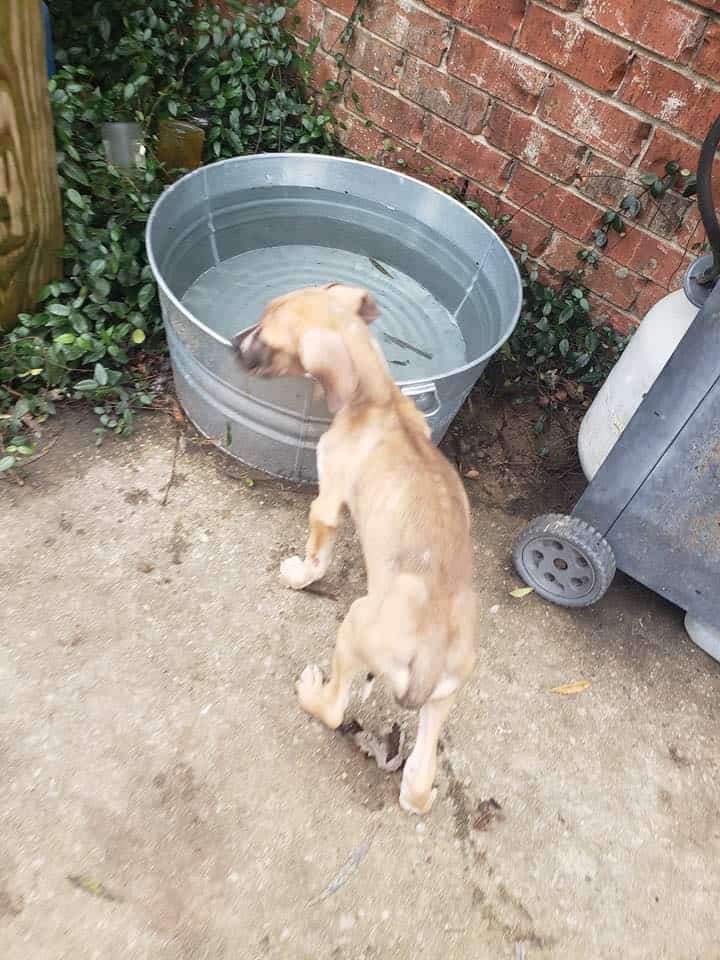You may have seen them, those pet stores in the mall and strip malls. Pet store puppies are adorable!
The pet shop has glass kennels full of adorable baby puppies that paw at the glass and look at you, begging you to take them home! The store feels cheery and fun.
Some of the puppies may even look sickly and desperate to be ‘rescued’ from the pet store. They hang their head and look like they need to be fed.
Great Dane puppies in pet stores tend to look especially sad because they grow so fast. The pet stores are not equipped to deal with them or their nutritional needs.
The employees will tell you that the puppies are from ‘family breeders’ and that they have ‘pedigrees’, meant to make you feel better about purchasing one. The prices are usually astronomical, which is also a marketing tactic built around the belief that higher pricing = higher quality.

A sweet, poorly bred double merle ‘merlequin’ puppy from Petland
Great Dane Puppy at Petland
Pet Store Great Danes are often shipped from other States, in semi-trucks full of dogs.
By the time these puppies are moved from their ‘breeder’ to the pet store, and then spend a day or two in a small pet store display case, they can look positively scrawny and even sick.
These puppies are not given the best start in life, to begin with, and then they are distributed to pet stores the same way that beach balls and loaves of bread might be.
They are fed an incorrect diet, kept confined in the glass cases for hours of each day and night, and are often suffering from infections or even parasites.
By the time they are ‘sold,’ they are often in the middle of, or past their socialization window.
Pet store puppies come with a NO RETURNS policy. It is up to the buyer to deal with the dog for life, even if serious health problems, temperament issues, or family problems pop up in the future.

Bad Beginnings for Pet Store Puppies
It does NOT matter what the pet store tells you. Pet Store Great Danes do NOT come from ethical, reputable, or quality breeders
Ever. It’s impossible. No ethical, reputable breeder would allow their puppy to be sold in a pet store to a random buyer, no matter what they tell you. Ethical breeders want a relationship with every puppy buyer and if they ship the puppies that they love and worked so hard for to Petland, that won’t happen.
Pet store puppies come from puppy mills. A puppy mill can be a large operation with lots of dogs (common in Missouri), an Amish pet farm, or a ‘ranch’ or ‘family’ that breeds multiple breeds in their backyard using kennels and runs.
These dogs are bred indiscriminately, regardless if they have issues with health and temperament.
Many of the dogs used in puppy mill breeding operations (even the nice-sounding ‘family breeder’ ones) are kept primarily in cages and kennels for most of their life. They are not often, if at all offered any kind of enrichment outside of this environment. These dogs receive no training titles (Canine Good Citizen) or show titles, and wouldn’t likely be able to obtain them anyway.
In some of the worst mills, the dogs live in crates with wire bottoms. They are bred there and whelp (birth) their puppies in this environment. Other dogs in cages contribute to anxiety and noise levels (barking, howling, crying). Remember, stressed-out mothers create timid, fearful, and stressed puppies.
The puppies are raised inside of this cage or a small ‘whelping area’, and removed before 8 weeks so they can be shipped to pet stores. On her next heat cycle, the mom is bred again.
Once she no longer produces babies, they either euthanize her (often inhumanely) or dump her in a rescue, where she often requires significant physical and emotional rehabilitation.

Pet Store Puppies Reward Puppy Mills
When you purchase a puppy from a pet store or from a puppy mill you directly finance, endorse, and support this kind of operation.
You reward the people for breeding dogs this way. You give them money to continue doing it.
You perpetuate the problem.
You may have ‘saved’ the one cute, scrawny, sickly-looking puppy that came with a ‘health guarantee’ and ‘papers’, but that’s it.
The mother of your dog will be bred again. She will produce more puppies just like yours that will end up in the pet store, and you paid them to do it.
We aren’t here to make you feel bad, but we do need to be very clear about this.
Purchasing a sad puppy from a pet store is NOT RESCUE. It is considered extremely unethical when actual dog rescues with 501c3 papers purchase dogs from puppy mills to ‘save’ them.

The Catch-22 of Buying Puppies from Pet Stores
The reason puppy mills continue to exist is because people keep ‘rescuing’ dogs from them.
Think about this. They’ve scammed you.
A sick little puppy is pretty easy to sell! It tugs at your heartstrings. It makes you FEEL good about your purchase because you ‘saved’ the puppy.
The pet stores and the puppy mills know this and they capitalize on it.
The breeders of these dogs do NOT care about the dogs or the puppies. It’s up to us to care.
One of the most caring and impactful things we can do is to STOP supporting their business.

Should I Report Pet Stores With Sick Puppies?
Of course, each dog’s life is valuable. It has worth. There is no reason for that puppy to suffer and unfortunately, many do.
Many of these puppies struggle with painful health conditions. Pet store puppies are also known for being anxious, nervy and timid.
Suffering comes in many forms.
Purchasing a puppy from the pet store does not stop the suffering. But educating others and being an advocate for Great Danes does.
If you do see a pet store puppy that needs help, report them to animal control. Take a photo and share it with others. Resist the urge to purchase this puppy; he isn’t the only one that needs help or is suffering.
Write a review of the pet store online. Use Google, Yelp, social media, and your blog to put them on blast. Educate others about why ‘saving’ puppies from pet stores is contributing to the problem.
When a pet store cannot sell puppies, they often surrender them to veterinarians and rescues or give them away to employees. This is a much better place for them to be!

What Happens to Pet Store Puppies That Aren’t Sold?
It depends on the pet store and where the dog was sourced from, but the following things can happen:
- The price is reduced until somebody buys.
- The dog is transferred to another pet store.
- The dog is returned to the ‘breeder’ and becomes the breeder’s choice; used for breeding, sold at auction, hoarded, given away, or euthanized.
- The dog is given to an employee or veterinarian.
- The dog is dumped into rescue; sick puppies cost the rescue money they don’t have.
- The dog is euthanized (may be common if the dog is especially ill).
- The dog is returned to a breeder-store broker and resold elsewhere.
It’s a tragic fate for these dogs and extremely taxing on rescues, but the truth is that pet stores don’t have much trouble selling these puppies. The ‘sad puppy in the window’ doesn’t need saving, because if you don’t buy it somebody else likely will.
Then the cycle continues. Stop ‘rescuing’ dogs from pet stores, puppy mills, and garbage backyard breeders. Doing so is contributing to the perpetuation of this horrible, horrible problem.

How to Make a Difference
Look at all of the Great Danes that are sitting in rescues right now that need our help.
Look at the Great Dane rescues, too. Notice how they are desperate for financial donations and help with volunteering and fostering.
GET INVOLVED. Stop believing that you ‘saved’ a dog from a pet store, and start saving dogs. Be there when a mill breeder dumps a litter of sick and timid 4-month-old puppies on rescue.
Be there when an overbred mama with mastitis and parasites is found left on the side of the road
Be there when a rescue is called to deal with a hoarding case, where 50 dogs are found emaciated, starved, covered in sores and over-bred as part of a puppy mill operation that feeds the pet stores.
Be part of the big picture and part of the solution. None of this is fair to that one puppy at the pet store, but it’s especially not fair to the dogs that paved the way for the puppy to get there in the first place.




